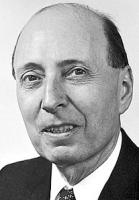| www.tmatlantic.com
Test & Soldering Equipment On-line Store |
|
D.E.V.I.C.E. (Wiki)Calculators Services |
|||||
Filter by first letter
|
Wigner, Eugene
Eugene Wigner was born in November 17 in 1902. He was a Hungarian-American theoretical physicist who also contributed to mathematical physics. He received the Nobel Prize in Physics in 1963 "for his contributions to the theory of the atomic nucleus and the elementary particles, particularly through the discovery and application of fundamental symmetry principles". His formal education was acquired in Europe; he obtained the Dr. Ing. degree at the Technische Hochschule Berlin. Dr.Wigner worked on the Manhattan Project at the University of Chicago during World War II, from 1942 to 1945, and in 1946-1947 became Director of Research and Development at Clinton Laboratories. In the postwar period, he served on a number of government bodies, including the National Bureau of Standards from 1947 to 1951, the mathematics panel of the National Research Council from 1951 to 1954, the physics panel of the National Science Foundation, and the influential General Advisory Committee of the Atomic Energy Commission from 1952 to 1957 and again from 1959 to 1964. In later life, Eugene Wigner became more philosophical, and published The Unreasonable Effectiveness of Mathematics in the Natural Sciences, his best-known work outside technical mathematics and physics. Eugene Wigner died on January 1, 1995. Citing www.wikipedia.org |
Site mapPrivacy policyTerms of Use & Store PoliciesHow to BuyShippingPayment




|

























